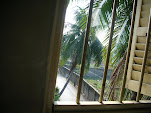When I got married I got introduced to a new set of men... male members of my new family.They were different from the males in our family. All at once I realised that I came from a family where the women were educated, broad minded, strong, vocal and definitely had an opinion. The men in our family, who were nearly all professors and lawyers by profession, were uber-educated, tolerant and peace-loving and that is why we children - girls and boys alike - grew up with a lot of freedom and space. The household (households, if you consider the extended family) was run in a fair and democratic way.
In my in-laws household, the males seemed to be domineering and very feudal in their ways. While we (in our childhood) were taught that it was uncouth to show arrogance, this new family of mine revelled in arrogance. This show of false attitude irked me for a long while. After a while I learned to respect the relationships (too late to cut loose), if not the men themselves.
This post is all about Khokababu - my new acquaintance. I have never ever known another person like Khokababu, and it makes me wonder about the male of the human species. This man is a stuffy pompous ass. He has an ego as inflated as a hot-air balloon ....and we all know how empty balloons are.This man (I cannot call him a gentleman) comes from a baniya Bengali family ( a very bad combination. Baniya Gujjus and baniya Marwaris are better people). The Khokababu was educated at an ordinary school (I have great respect for the term 'middle class' , and therefore will not use it here), and then at an upmarket College . What he does for a living is inconsequential, but his inter-personal skills are very, very poor indeed. The 'feudal bangali' attitude remains in him to the hilt. And the upbringing has obviously been poor because his unrefined ways shows in oh so many ways.
However, how he chooses to live his life is no concern of mine. Except that it left me thinking about such 'alpha-male' people that all of us have to encounter at some point of time. Why do these 'Khokababus" of society force themselves on others?
Why do others take these so called men lying down, and give in to their whims? A big pity that these sort of of egoistic, empty, arrogant, pompous people exist. Could their parents not teach them basic human qualities like tolerance, sympathy, compassion? Why is 'I' so BIG in their world? Followed almost immediately by 'MY'. .... .'MY IDEA'......'I DO NOT APPRECIATE' ...... 'IN MY OPINION'.........
MY dear man, does it strike you that your opinion, your appreciation, is not the end all and be all of everything. The sun doesn't exactly shine out of.........
The term Khokababu is used to denote these not-very-mature 'big boys' who behave like six year olds. Throw a tantrum when they are put in a situation of conflict. Pull on the 'I' act when their so called 'entity' is threatened and definitely behave in an all round uncouth fashion without any respect for age, gender, chair and most important....insaan.
From one insaan to another......can we not expect a little more refined behaviour from the Khokababus of this world? Can these pompous people grow up? And not be little boys. Could they face reality with some straightforward, old fashioned courage, and not hide away.(not that we want to see too much of them......)
Most often these people are not too above board and their skewed thought process would delight a psycho-analyst.
I have to admit that most men I have dealt with are fair and just. They have their quirky ways, but on the whole they are tolerant and gentle.Quite good company some of them......not so good the others.
The object of this post is to ask my readers.......do you know of such people? How many? How often do you meet this kind of Khokababus?Are they easy to deal with? I hope the Khokababus of the world are an abberation. I am sure they are.
Responses please.
